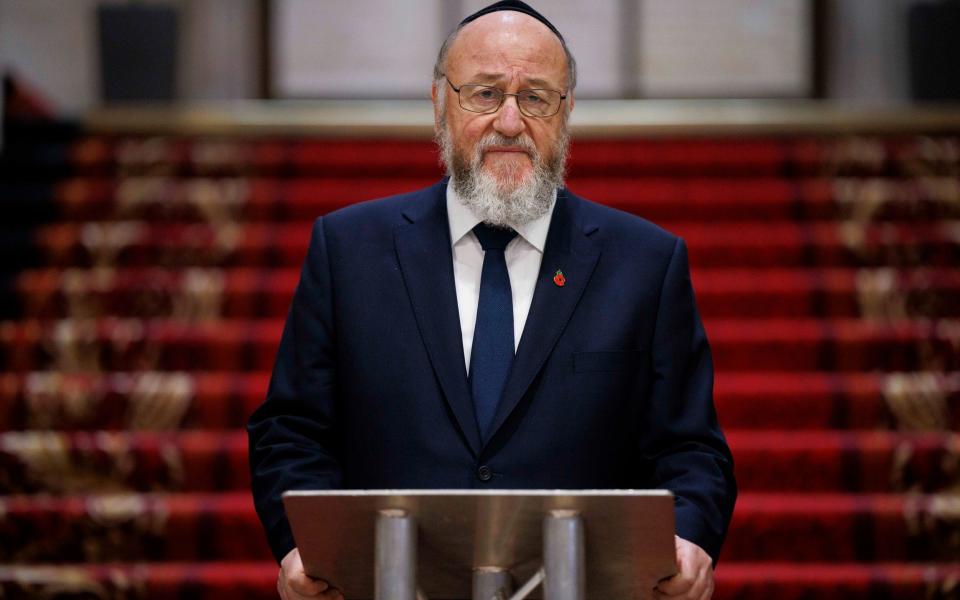Prince William sought Chief Rabbi’s guidance before calling for end to Gaza fighting

The Prince of Wales sought guidance from the Chief Rabbi before issuing his intervention calling for an end to the fighting in Gaza, The Telegraph understands.
The Prince, who enjoys a close relationship with Sir Ephraim Mirvis, is expected to condemn anti-Semitism when he joins young people at a synagogue discussion next week.
Kensington Palace aides have been in regular contact with the Chief Rabbi’s office since the 41-year-old Prince expressed a personal wish to use his platform to highlight the plight of millions of innocent civilians on both sides of the conflict.
In discussing the Prince’s intervention, they reassured them that his “clear view” on anti-Semitism would also be heard when he joins young advocates next week.
Although the Prince did not seek specific editorial approval for his message, he was keen to ensure that his language, and its sentiment, would not ruffle feathers with the Jewish community. “The two teams have been speaking regularly,” a source confirmed.
Prince William generated global headlines when he warned on Tuesday that “too many have been killed” in the Gaza conflict. He urged more humanitarian aid and the release of hostages as he called for “an end to the fighting as soon as possible”.
The rhetoric, unusual for a senior British royal, risked sparking a diplomatic rift with Israel, which responded by insisting that the fighting would end when all hostages had been released and Hamas had been defeated.
Israeli officials are understood to have been caught off guard by the Prince’s words and considered his statement naive, but did not want to enter into a row with the future King.

Yet the intervention came as no surprise to the Chief Rabbi, who welcomed it, saying: “Since his visit to the region in 2018, the Prince of Wales has shown a deep concern for the wellbeing of all those affected by the conflict in the Middle East and his words of compassion, which I welcome, are yet further evidence of this.
“His plan to visit a synagogue to learn more about the troubling global increase in anti-Semitism will send a powerful message that there must be no place for anti-Jewish hatred in our society.”
The Telegraph understands that the Chief Rabbi did not see Prince William’s statement in advance.
The Prince is understood to have been pleased with the largely positive international reaction to his statement.
Although Buckingham Palace declined to reveal whether he had discussed it with the King in advance, sources insisted that the 75-year-old monarch was likely to be familiar with his elder son’s views on the subject.
The Prince’s sentiments are broadly considered to be aligned with his father’s efforts to build bridges between different faiths.
While there was criticism of the heir to the throne from some politicians, who suggested he had overstepped his role, his decision to speak out was considered indicative of the Prince’s desire to make his views heard on certain subjects about which he feels passionate.
Other dissenting voices included Jake Walls Simons, the editor of the Jewish Chronicle, who suggested the Prince’s statement was “well meaning but naive”.
He said: “It’s something of a luxury to emphasise the fact that nobody wants anybody to be killed when you’re 3,000 miles away in Windsor Castle. On the ground, you don’t have that luxury because they are killing you.
“I’d be curious to see a statement on some of the other, much more bloodthirsty wars of this decade. Why only talk about this one? I fear he’s responding to the media circus rather than being the objective, considered leader we hope he will become.”
However, many other Jewish leaders welcomed the statement, recognising that the Royal family has long enjoyed a close relationship with the community.
Sir Ephraim accompanied the Prince when he visited Israel and the Occupied Palestinian Territories in 2018.
In October, he shared a personal letter the Prince had written reflecting on the trip. “I do hope though that in time, voices calling for peace, common understanding and co-existence can once again come to the fore,” he wrote.


